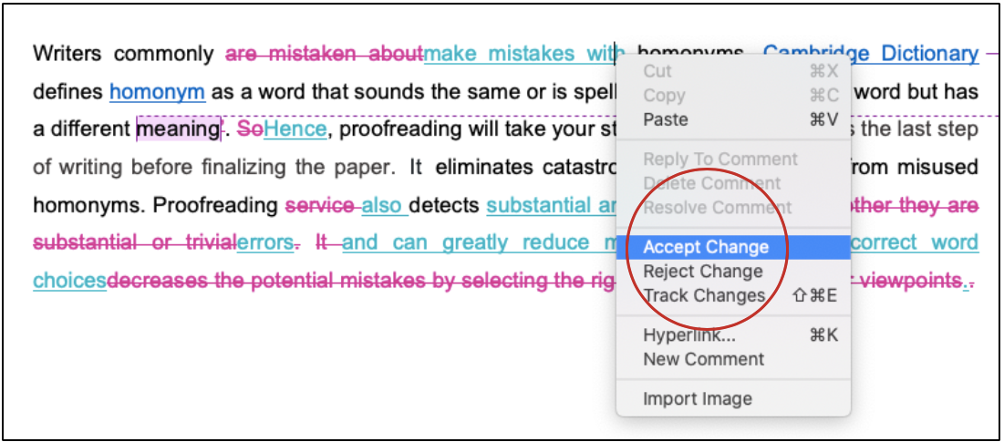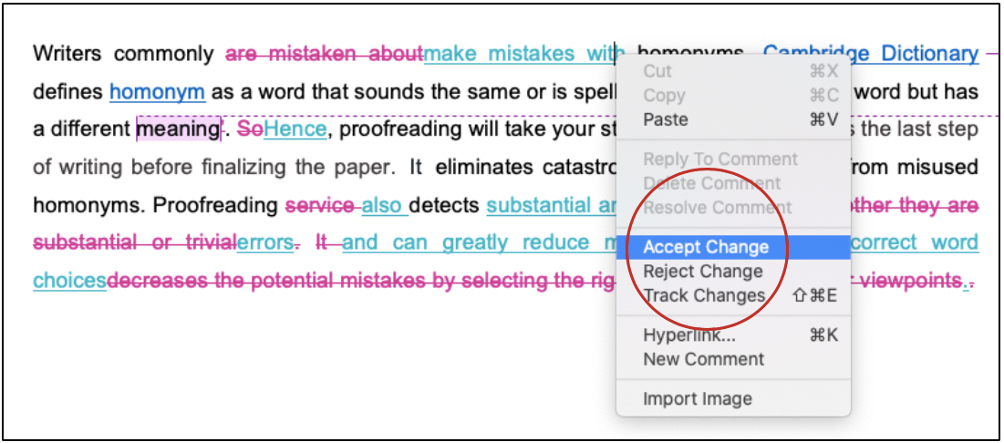Researchers who are not native speakers of English are mostly confronted with some challenges in getting their papers published. This is probably why the editing and proofreading business has flourished in the field of academics over the past decade. Still, this business is inefficiently controlled and is often extremely problematic. The quality of the services is extremely uneven, and target groups of the editing services (e.g., clients, peer-reviewed journals, institutions, and readers) may be shackled by several fallacies. To deal with them, we discuss some myths about academic editing and proofreading services.

This article discusses the importance of editing and proofreading services. Authorities of the English language always recommend that authors should not merely rely on their own improvements and corrections. Keep in mind that there is always a possibility that your manuscript may contain some errors and that you may have missed some essential issues because, as an author, you were deeply involved in the process of writing the paper. After you have completed the writing process, it would be helpful to get a third eye to edit or proofread the manuscript for you. A fresh pair of eyes will be most helpful to identify and correct any error that you may have missed out in your document. You may be surprised at the number of errors that they have detected and that you have not spotted. Hence, editing and proofreading services are of great importance.
As we discussed earlier on our academy page, the difference between editing and proofreading can be a challenging issue to comprehend. We explained the main difference between these concepts in detail. The blog provided a wide-ranging overview of editing and proofreading and argued what each of the services includes. Knowing their differences is especially of importance when you intend to avail yourself of services to polish your paper.
Let us briefly remember the difference between editing and proofreading services. Principally, the purpose of proofreading services is to correct all errors, including grammar, typography, punctuation, syntax, and spelling, in an academic paper, whereas the aim of editing services is to improve the overall quality of writing. On the one hand, proofreading services necessitate an extensive knowledge of the English language. In this sense, proofreading is basically the final process of preparing an academic manuscript. Hence, when you want to make sure that the final version of your paper is error free in terms of grammatical, typographical, syntactical, punctuation, and spelling issues, you should consider proofreading services. On the other hand, editing services require extra effort from an editor because it aims to improve the academic quality of your document. Thus, editing services typically comprise improvements of the content, overall structure, quality of findings and analysis, referencing, and format of your manuscript.

Academic editing makes some essential revisions to improve the academic quality and standard of the academic writing of your manuscript. Therefore, editors mostly re-write some parts of your academic writing while exercising care not to create text as this is not the responsibility of the editor but of the author. This re-writing process is of particular importance because the main objective of editing services is to ensure that the purpose of the manuscript is met. However, editing services also check whether the manuscript has any grammatical, spelling, or punctuation errors to guarantee that the paper is error-free.
Hence, editing services also aim to correct all errors in grammar, typography, punctuation, syntax, and spelling in your manuscript. In this sense, editing services comprise the proofreading services. However, strictly speaking, proofreading is the last stage before it is delivered to the client. Thus, even if the editor has corrected many of the errors that a proofreader would correct, the paper must still pass through this last stage. Whether your manuscript is a doctoral dissertation, a master’s thesis, a college essay document, or a business text, to make it shine, Best Edit & Proof's editors insistently advise our customers to opt for the editing services instead of the mere proofreading services.
The following analogy of Dr. Courtney, a Best Edit & Proof editor and proofreader, explains this situation well. Suppose that an architect (in our case, the editor) takes a tenement and renovates it by removing the present walls and replacing them with new materials, adding new spaces, removing floorboards, and setting up new parterre. Thus, the space is now a newly created building on the same basis. Later, the building control officer (in our case, the proofreader) comes along to make sure that everything is properly in place, especially details for safety precautions. The main role of the control officer here is not to create anything. Thus, the proofreader’s purpose is not creative.

Writing skills and academic skills are totally different things. Without a shadow of a doubt, even prominent scholars do not always write well. Similarly, their studies are not always well-edited or proofread.
It is even possible for writers to have a doctoral degree and not be able to edit! Arguably, you may know doctoral students and writers with doctoral qualifications who cannot write very well in English. They know what they want to say, but they do not have all the skills to put the words together.
Moreover, researchers who are not native speakers of English are mostly confronted with some challenges in getting their papers published. This is probably why the editing and proofreading business has flourished in the field of academics over the past decade. Still, this business is inefficiently controlled and is often extremely problematic. The quality of the services is extremely uneven, and target groups of the editing services (e.g., clients, peer-reviewed journals, institutions, and readers) may be shackled by several fallacies. To deal with them, we discuss some myths about academic editing and proofreading below:
The first misconception is the belief that cheap editing and proofreading services are still good enough, which is rarely the case. They are indeed not. The issue here is that to edit and proofread a manuscript well, one must not only grasp the matter in question at a doctoral level but also know how to write well and properly. When an underqualified editor gets the job, the outcome is often so poor that one would never notice that someone examined your manuscript. You may say that, probably, the editor has not gotten his/her mitts on the paper.
The second misconception about editing and proofreading services is that expensive editors or proofreaders are better than cheaper ones. This is, of course, another myth because being an expensive editor does not necessarily mean that he/she will produce better jobs. All editors or editing companies, of course, allege to provide an excellent editing service, but what’s actually done could be no more than basic proofreading, and even that belief may be inaccurate.

The truth is that one does not need to have perfect grammar skills to be a good writer. Undoubtedly, grammar is an inseparable part of students’ grades in English classes, but the process of writing is totally separate from the process of editing. For instance, typical books must go through at least four or five processes of editing and proofreading. Does it mean that the authors of books are not good writers? Does it mean that they do not have the capacity to detect all quotation marks and do not know where to put them? Of course, they are good writers. However, there is always a possibility that good writers made some errors in the document and that they may have missed some fundamental grammatical rules because they were deeply involved in the process of writing the manuscript. Thus, it will be helpful to get a third eye to edit or proofread these manuscripts after the writing process.
This argument is simply not true! Even the best writers or scholars need good editing and proofreading services. Honestly, sometimes, it’s the truly gifted writers who may need editing services the most. The main reason for this is that writing an academic paper or a book means the author has to be deeply involved in the writing process. It is necessary to produce a very well-written paper, but it is also almost impossible for the author to assess the quality of his/her own writing. Good editors and proofreaders help authors who are stuck in their work and those who are mostly strained at gnats and swallow camels.

Some editors assert to be native English speakers, but they are truly not. You can come across an editor claiming that he/she is a native English speaker because of having a doctoral study in the United States or the United Kingdom. However, such a qualification does not necessarily mean that the editor is already a native English speaker. Moreover, researchers often suppose that if they have one or more native English-speaking co-authors, they do not need to have editing or proofreading services, which is indeed untrue.
As discussed earlier, even outstanding native English speaker scholars do not always write well. It is also possible for writers to have a doctoral degree and not be able to edit! Arguably, you may know so many scholars with doctoral qualifications but cannot write very well in English even though they are native English speakers. They know what they want to say, but they do not have all the skills to correctly put the words together. Consequently, there is no substitute for a third eye, and it would be helpful to get a third eye to edit or proofread the manuscript for you. Hence, a fresh and objective pair of eyes will identify and correct any error you may have missed in your document.
Good writers and publishers recognize that editors are needed because they make a lot of essential changes that make the manuscripts shine. Generally, editing tasks require more extra effort from an editor than proofreading services because editing services aim to improve the academic quality of the manuscript. An editor will, of course, make several fundamental changes to improve the standard of your writing. As a natural consequence of this fact, editors sometimes have to re-write some parts of your document. This process is especially important because an editor aims to ensure that the purpose of the document is met.
Skilled editors always have a logical reason to make the revisions, even though the author or writer may not agree with them. Once the author grasps what the main reason is, they will be better equipped to decide whether to keep the change. Moreover, all edited documents are returned with all edits visibly marked. All of the edits, including corrections, suggestions, and comments, appear in the margins of the returned document via the Track Changes function, making it easy to see and follow all the suggestions and changes made by the editor and to either accept or reject them. The client will also see some essential comments that the editor has left on the right-hand side of the page.
Best Edit & Proof expert editors and proofreaders focus on offering manuscripts with proper tone, content, and style of academic writing, and also provide an upscale editing and proofreading service for you. If you consider our pieces of advice, you will witness a notable increase in the chance for your research manuscript to be accepted by the publishers. We work together as an academic writing style guide by bestowing subject-area editing and proofreading around several categorized writing styles. With the group of our expert editors, you will always find us all set to help you identify the tone and style that your manuscript needs to get a nod from the publishers.

You can also avail of our assistance if you are looking for editors who can format your manuscript, or just check on the particular styles for the formatting task as per the guidelines provided to you, e.g., APA, MLA, or Chicago/Turabian styles. Best Edit & Proof editors and proofreaders provide all sorts of academic writing help, including editing and proofreading services, using our user-friendly website, and a streamlined ordering process.
Visit our order page if you want our subject-area editors or language experts to work on your manuscript to improve its tone and style and give it a perfect academic tone and style through proper editing and proofreading. The process of submitting a paper is very easy and quick. Click here to find out how it works.
Our pricing is based on the type of service you avail of here, be it editing or proofreading. We charge on the basis of the word count of your manuscript that you submit for editing and proofreading and the turnaround time it takes to get it done. If you want to get an instant price quote for your project, copy and paste your document or enter your word count into our pricing calculator.
Contact us to get support with academic editing and proofreading. We have a 24/7 active live chat mode to offer you direct support along with qualified editors to refine and furbish your manuscript.
Follow us on Twitter, LinkedIn, Facebook, Instagram, and Medium.
For more posts, click here.
This article discusses six myths about academic editing and proofreading. To give you an opportunity to practice proofreading, we have left a few spelling, punctuation, or grammatical errors in the text. See if you can spot them! If you spot the errors correctly, you will be entitled to a 10% discount.

When you start with academic writing, it is easy to confuse editing and proofreading. Each service requires close and careful reading but uses different methods and focuses on different aspects of the manuscript. Both services produce different outcomes for writers, and therefore, our potential clients must be aware of what they do. As a beginner, you may make the same common mistake as the rest, but we are here to help things set straight. In this article, we will learn the exact meaning behind these two concepts, what they are, and how they are different from each other.
Continue Reading
Every book that you read, every newspaper and magazine you subscribed to, every blog that you have come across — all went through the radar of editing and proofreading before coming to you. So, if you are thinking about whether you can make a career in the field of editing and proofreading or not, the answer is yes. The only thing is, you need to have the talents and the qualifications, all of which we will discuss in this article. Therefore, if you are ready, let us look at all the things you need to know to become a proficient editor or proofreader.
Continue Reading
Although some scholars and students use the terms interchangeably, editing and proofreading services are two different stages of the revision process. Both services use different methods and center on different aspects of the writing, but both require close and careful reading. They produce different outcomes for writers. However, both proofreading and editing must improve the quality of the written work.
Continue Reading
Proofreading is one of the basic procedures carried out on a text to render it flawless. This procedure requires extensive knowledge and comprehension to correct a manuscript excellently. Proofreading is of importance when you need your document to be checked for errors in grammar, punctuation, syntax, spelling, and formatting.
Continue Reading
Thesis and dissertation editing services eliminate linguistic errors, augment contextual legibility and thus, improve the overall quality of a manuscript. In other words, dissertation and thesis editing services are beneficial for any academic looking to enhance their meticulously crafted document. This article highlights some of the significant benefits that come with patronizing dissertation and thesis editing services. Thus, readers considering hiring one of these services should read it till the end to formulate concrete opinion.
Continue Reading
Looking at it from an objective viewpoint, editing as a process garners much flak from academics. Scholars either schedule it for the night before the deadline or display their bravado by entirely skipping it. Editing is, by all means, a resource-intensive and mentally taxing task. But it is also a crucial step in the writing process that enhances a document's overall legibility.
Continue Reading
Proofreading a dissertation differs from dissertation editing in the aspect that it does not drastically change the composition of the manuscript. The fundamental purpose of dissertation proofreading is to enhance a document's linguistic clarity and formatting. And as such, the amount of time required to proofread is lower than that needed to edit a dissertation. It is an integral part of the dissertation submission process that ensures a manuscript's overall veracity. But, owing to its low turnaround time and seemingly lackluster objective, many academics do not prioritize proofreading adequately.
Continue Reading